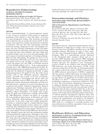 19 citations,
March 2008 in “Nature clinical practice endocrinology & metabolism”
19 citations,
March 2008 in “Nature clinical practice endocrinology & metabolism” A combined drug and laser treatment improved hirsutism in a PCOS patient, also enhancing her heart health and requiring regular liver and kidney checks.
 14 citations,
May 2012 in “Endocrine Research”
14 citations,
May 2012 in “Endocrine Research” The same hormone can affect gene expression differently in various tissues, which could lead to new treatments for conditions like hair loss.
 14 citations,
January 2012 in “Endocrine development”
14 citations,
January 2012 in “Endocrine development” The conclusion is that a thorough approach is needed to diagnose and manage hyperandrogenism in teenage girls, recognizing its major psychological and health effects.
 14 citations,
March 2010 in “Gynecological endocrinology”
14 citations,
March 2010 in “Gynecological endocrinology” New treatments for excessive hair growth in women include insulin modulators and enzyme inhibitors.
 14 citations,
November 2008 in “Expert opinion on drug metabolism & toxicology”
14 citations,
November 2008 in “Expert opinion on drug metabolism & toxicology” Finasteride helps treat prostate issues and may prevent prostate cancer in high-risk men.
 11 citations,
January 2017 in “Journal of Endocrinology/Journal of endocrinology”
11 citations,
January 2017 in “Journal of Endocrinology/Journal of endocrinology” Female mice with disrupted 5α-reductase 1 had significant metabolic issues, including stress response problems, insulin resistance, liver fat buildup, and obesity.
 8 citations,
August 2020 in “Clinical and Experimental Dermatology”
8 citations,
August 2020 in “Clinical and Experimental Dermatology” Spironolactone is a low-cost, effective, and generally safe treatment for various skin conditions related to hormones.
 8 citations,
March 2020 in “Metabolites”
8 citations,
March 2020 in “Metabolites” Finasteride treatment changes urine metabolomics and steroid signatures, potentially monitoring effectiveness but may cause sexual side effects.
 6 citations,
December 2015 in “JAMA”
6 citations,
December 2015 in “JAMA” The woman's high testosterone levels indicated PCOS, leading to treatment that improved her symptoms.
 6 citations,
July 2013 in “Acta Clinica Belgica”
6 citations,
July 2013 in “Acta Clinica Belgica” The document concludes that combination therapy is most effective for treating excessive hair growth in women with idiopathic hirsutism, and more research is needed to understand the condition.
 5 citations,
January 2014 in “International journal of gynaecology and obstetrics”
5 citations,
January 2014 in “International journal of gynaecology and obstetrics” HIV-positive pregnant women are more likely to experience severe bleeding, and a pregnant woman with familial hypertriglyceridemia had a successful early delivery with special care.
 5 citations,
April 2011 in “The Lancet”
5 citations,
April 2011 in “The Lancet” Untreated congenital adrenal hyperplasia can lead to complications like stroke and needs glucocorticoid treatment.
 4 citations,
May 2022 in “BMC Women's Health”
4 citations,
May 2022 in “BMC Women's Health” High levels of anti-Müllerian hormone can indicate polycystic ovarian syndrome in women who can have babies.
 4 citations,
July 2021 in “Journal of Dermatological Treatment”
4 citations,
July 2021 in “Journal of Dermatological Treatment” Finasteride helps hair growth but may cause sexual side effects and depression.
 3 citations,
October 1982 in “Postgraduate Medicine”
3 citations,
October 1982 in “Postgraduate Medicine” Most types of hair loss can regrow naturally, but there are no effective cures for male pattern or age-related hair loss, and only limited options for females.
 2 citations,
May 2023 in “Current Nutrition Reports”
2 citations,
May 2023 in “Current Nutrition Reports” Eating a Mediterranean diet and taking certain supplements may improve symptoms of PCOS.
 2 citations,
September 2019 in “Acta Cardiologica”
2 citations,
September 2019 in “Acta Cardiologica” Women with non-classic congenital adrenal hyperplasia have higher risk for heart and metabolic problems.
1 citations,
January 2024 in “International journal of molecular sciences” MicroRNAs could be key biomarkers and therapeutic targets for PCOS.
 1 citations,
November 2023 in “Journal of ovarian research”
1 citations,
November 2023 in “Journal of ovarian research” Agaricus subrufescens improves ovarian function and biochemical health in rats with PCOS.
 1 citations,
February 2022 in “Case reports in endocrinology”
1 citations,
February 2022 in “Case reports in endocrinology” An unusual growth of Leydig cells in a woman's ovaries caused her excessive hair growth, which was treated successfully with surgery.
 1 citations,
March 2020 in “Current Science”
1 citations,
March 2020 in “Current Science” Most people in the surveyed area experience hair loss, but they are not aware of the role of diet, iron, hormones, genetics, and possibly water quality in causing it.
 September 2024 in “Medicina”
September 2024 in “Medicina” Certain gene variations may protect against skin issues and oxidative stress in women with PCOS.
 March 2024 in “Cell communication and signaling”
March 2024 in “Cell communication and signaling” Lack of sleep in mice leads to prostatitis by reducing certain hormones and activating an inflammatory pathway, which can be temporarily fixed with normal sleep.
 October 2023 in “IntechOpen eBooks”
October 2023 in “IntechOpen eBooks” Genes and epigenetic changes are important in the development of Polycystic Ovary Syndrome.
 July 2023 in “Journal of Clinical Medicine”
July 2023 in “Journal of Clinical Medicine” Tirzepatide might help manage PCOS in obese patients but needs more research to confirm safety and effectiveness.
 June 2023 in “International Journal of Research in Dermatology”
June 2023 in “International Journal of Research in Dermatology” Certain gene variations are linked to severe acne in Egyptian patients and could guide treatment choices.
 September 2022 in “Biomedicines”
September 2022 in “Biomedicines” Lipid Accumulation Product and Free Androgens Index are effective for assessing fatty liver disease risk in women with Polycystic Ovary Syndrome.

There are many ways to treat Polycystic Ovary Syndrome, including lifestyle changes, surgery, and various medications, but more research is needed for better treatments.
 December 2020 in “Current Sexual Health Reports”
December 2020 in “Current Sexual Health Reports” Finasteride can have lasting negative effects on brain function and behavior by disrupting neurosteroid production.
 April 2020 in “Journal of the Endocrine Society”
April 2020 in “Journal of the Endocrine Society” A woman's severe hirsutism was caused by Leydig cell tumors in her ovaries, which improved after surgery.





























